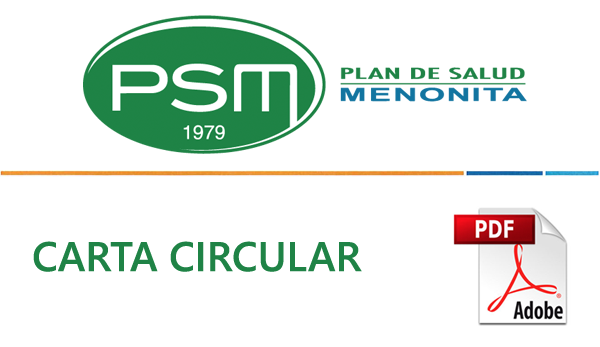
Categoría: Noticias

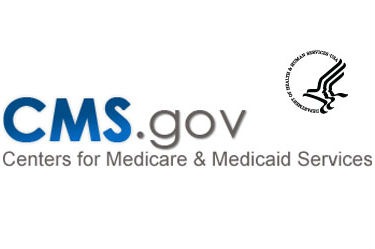
CMS Announces Relief for Clinicians, Providers, Hospitals and Facilities Participating in Quality Reporting Programs in Response to COVID-19
In: Circulares, Comunicados, NoticiasThe Centers for Medicare & Medicaid Services (CMS) is supporting clinicians on the front lines by getting red tape out of the way so the healthcare delivery system can focus on the 2019 Novel Coronavirus (COVID-19) response. CMS is implementing additional extreme and uncontrollable circumstances policy exceptions and extensions for upcoming quality measure reporting and data submission deadlines for the following CMS programs:
| Provider Programs | 2019 Data Submission | 2020 Data Submission |
Merit-based Incentive Payment System (MIPS) |
Deadline extended from March 31, 2020 to April 30, 2020.
MIPS eligible clinicians who have not submitted any MIPS data by April 30, 2020 will qualify for the automatic extreme and uncontrollable circumstances policy and will receive a neutral payment adjustment for the 2021 MIPS payment year. |
CMS is evaluating options for providing relief around participation and data submission for 2020. |
|
| Hospital Programs | 2019 Data Submission | 2020 Data Submission |
|
Deadlines for October 1, 2019 – December 31, 2019 (Q4) data submission optional.
If Q4 is submitted, it will be used to calculate the 2019 performance and payment (where appropriate). If data for Q4 is unable to be submitted, the 2019 performance will be calculated based on data from January 1, 2019 – September 30, 2019 (Q1-Q3) and available data.
|
CMS will not count data from January 1, 2020 through June 30, 2020
(Q1-Q2) for performance or payment programs. Data does not need to be submitted to CMS for this time period.
* For the Hospital-Acquired Condition Reduction Program and the Hospital Value-Based Purchasing Program, if data from January 1, 2020 – March 31, 2020 (Q1) is submitted, it will be used for scoring in the program (where appropriate). |
|
||
|
||
|
||
|
||
|
||
|
||
|
||
|
||
|
||
|
||
| Post-Acute Care (PAC) Programs | 2019 Data Submission | 2020 Data Submission |
|
Deadlines for October 1, 2019 – December 31, 2019 (Q4) data submission optional.
If Q4 is submitted, it will be used to calculate the 2019 performance and payment (where appropriate).
|
Data from January 1, 2020 through June 30, 2020 (Q1-Q2) does notneed to be submitted to CMS for purposes of complying with quality reporting program requirements.
* Home Health and Hospice Consumer Assessment of Healthcare Providers and Systems (CAHPS) survey data from January 1, 2020 through September 30, 2020 (Q1-Q3) does not need to be submitted to CMS.
*For the Skilled Nursing Facility (SNF) Value-Based Purchasing Program, qualifying claims will be excluded from the claims-based SNF 30-Day All-Cause Readmission Measure (SNFRM; NQF #2510) calculation for Q1-Q2.
|
|
||
|
||
|
||
|
||
|
CMS is granting exceptions and extensions to assist health care providers and suppliers while they direct their resources toward caring for their patients and ensuring the health and safety of patients and staff. For those programs with data submission deadlines in April and May 2020, submission of those data will be optional based on the facility’s choice to report. In addition, no data reflecting services provided January 1, 2020-June 30, 2020 will be used in CMS’ calculations for the Medicare quality reporting and value-based purchasing programs in order to reduce providers’ data collection and reporting burden as they are responding to the COVID-19 pandemic.
CMS recognizes that quality measure reporting may not be reflective of performance for measures such as cost, readmissions and patient experience during this time of emergency and seeks to hold organizations harmless for data during this period. CMS will continue to monitor the situation and adjust reporting periods and submission deadlines accordingly. More detailed information about changes to each of these quality reporting programs will be provided soon.
Quality Payment Program
2019 MIPS Submission Deadline Extended: Submit 2019 Data by April 30, 2020
The 2019 Merit-based Incentive Payment System (MIPS) data submission deadline will be extended by 30 days to April 30, 2020. If you have already submitted MIPS data or if you submit MIPS data by April 30, 2020, you will be scored and receive a MIPS payment adjustment based on the data you submit. Many MIPS eligible clinicians have performed very well in the MIPS program in previous years. If you need to revise any data that has already been submitted you can still make changes by logging into qpp.cms.gov by the new deadline.
2019 MIPS Automatic Extreme and Uncontrollable Circumstances Policy Update
MIPS eligible clinicians who have not submitted any MIPS data by April 30, 2020 do not need to take any additional action to qualify for the automatic extreme and uncontrollable circumstances policy. These clinicians will be automatically identified and receive a neutral payment adjustment for the 2021 MIPS payment year. All four MIPS performance categories for these clinicians will be weighted at zero percent, resulting in a score equal to the performance threshold, and a neutral MIPS payment adjustment for the 2021 MIPS payment year. However, if a MIPS eligible clinician submits data on two or more MIPS performance categories, they will be scored and receive a 2021 MIPS payment adjustment based on their 2019 MIPS final score.
CMS will continue monitoring the developing COVID-19 situation and assess options to bring additional relief to clinicians and their staff so they can focus on caring for patients.
For More Information
Please reference the 2019 QPP Data Submission User Guide. CMS also has up to date information about its programs and response to COVID-19 on the Current Emergencies page.
For Quality Payment Program questions you can contact 1-866-288-8292, Monday through Friday, 8:00 AM-8:00 PM ET or by e-mail at:QPP@cms.hhs.gov.
- Customers who are hearing impaired can dial 711 to be connected to a TRS Communications Assistant.

CMS Coronavirus (COVID19) Partner Toolkit
In: Circulares, Comunicados, NoticiasGreetings to all providers in PR and the USVI.
In an effort to help providers stay informed about the COVID19, CMS has developed the following toolkit: https://www.cms.gov/outreach-education/partner-resources/coronavirus-covid-19-partner-toolkit. Please, navigate the link and share with the most providers as you can. Your feedback is important to us during this emergency. Let me know should you have questions related this toolkit or any related concern. My contact information is below my signature for you to reach out.

Carta Circular 20-011
In: Circulares, Normativas, Noticias
Carta Circular 20-010
In: Circulares, Normativas, Noticias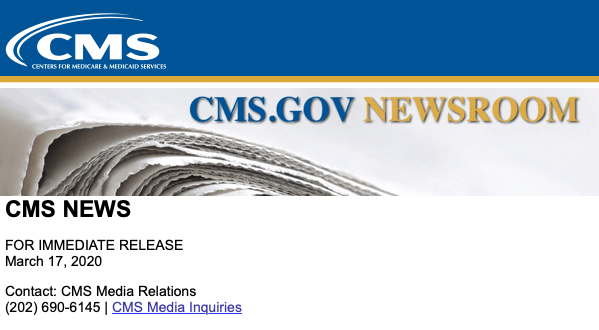
CMS NEWS: President Trump Expands Telehealth Benefits for Medicare Beneficiaries During
In: Comunicados, NoticiasCMS NEWS
FOR IMMEDIATE RELEASE
March 17, 2020
Contact: CMS Media Relations
(202) 690-6145 | CMS Media Inquiries
President Trump Expands Telehealth Benefits for Medicare Beneficiaries During
COVID-19 Outbreak
CMS Outlines New Flexibilities Available to People with Medicare
The Trump Administration today announced expanded Medicare telehealth coverage that will enable beneficiaries to receive a wider range of healthcare services from their doctors without having to travel to a healthcare facility. Beginning on March 6, 2020, Medicare—administered by the Centers for Medicare & Medicaid Services (CMS)—will temporarily pay clinicians to provide telehealth services for beneficiaries residing across the entire country.
“The Trump Administration is taking swift and bold action to give patients greater access to care through telehealth during the COVID-19 outbreak,” said Administrator Seema Verma. “These changes allow seniors to communicate with their doctors without having to travel to a healthcare facility so that they can limit risk of exposure and spread of this virus. Clinicians on the frontlines will now have greater flexibility to safely treat our beneficiaries.”
On March 13, 2020, President Trump announced an emergency declaration under the Stafford Act and the National Emergencies Act. Consistent with President Trump’s emergency declaration, CMS is expanding Medicare’s telehealth benefits under the 1135 waiver authority and the Coronavirus Preparedness and Response Supplemental Appropriations Act. This guidance and other recent actions by CMS provide regulatory flexibility to ensure that all Americans—particularly high-risk individuals—are aware of easy-to-use, accessible benefits that can help keep them healthy while helping to contain the spread of coronavirus disease 2019 (COVID-19).
Prior to this announcement, Medicare was only allowed to pay clinicians for telehealth services such as routine visits in certain circumstances. For example, the beneficiary receiving the services must live in a rural area and travel to a local medical facility to get telehealth services from a doctor in a remote location. In addition, the beneficiary would generally not be allowed to receive telehealth services in their home.
The Trump Administration previously expanded telehealth benefits. Over the last two years, Medicare expanded the ability for clinicians to have brief check-ins with their patients through phone, video chat and online patient portals, referred to as “virtual check-ins”. These services are already available to beneficiaries and their physicians, providing a great deal of flexibility, and an easy way for patients who are concerned about illness to remain in their home avoiding exposure to others.
A range of healthcare providers, such as doctors, nurse practitioners, clinical psychologists, and licensed clinical social workers, will be able to offer telehealth to Medicare beneficiaries. Beneficiaries will be able to receive telehealth services in any healthcare facility including a physician’s office, hospital, nursing home or rural health clinic, as well as from their homes.
Medicare beneficiaries will be able to receive various services through telehealth including common office visits, mental health counseling, and preventive health screenings. This will help ensure Medicare beneficiaries, who are at a higher risk for COVID-19, are able to visit with their doctor from their home, without having to go to a doctor’s office or hospital which puts themselves or others at risk. This change broadens telehealth flexibility without regard to the diagnosis of the beneficiary, because at this critical point it is important to ensure beneficiaries are following guidance from the CDC including practicing social distancing to reduce the risk of COVID-19 transmission. This change will help prevent vulnerable beneficiaries from unnecessarily entering a healthcare facility when their needs can be met remotely.
President Trump’s announcement comes at a critical time as these flexibilities will help healthcare institutions across the nation offer some medical services to patients remotely, so that healthcare facilities like emergency departments and doctor’s offices are available to deal with the most urgent cases and reduce the risk of additional infections. For example, a Medicare beneficiary can visit with a doctor about their diabetes management or refilling a prescription using telehealth without having to travel to the doctor’s office. As a result, the doctor’s office is available to treat more people who need to be seen in-person and it mitigates the spread of the virus.
As part of this announcement, patients will now be able to access their doctors using a wider range of communication tools including telephones that have audio and video capabilities, making it easier for beneficiaries and doctors to connect.
Clinicians can bill immediately for dates of service starting March 6, 2020. Telehealth services are paid under the Physician Fee Schedule at the same amount as in-person services. Medicare coinsurance and deductible still apply for these services. Additionally, the HHS Office of Inspector General (OIG) is providing flexibility for healthcare providers to reduce or waive cost-sharing for telehealth visits paid by federal healthcare programs.
Medicaid already provides a great deal of flexibility to states that wish to use telehealth services in their programs. States can cover telehealth using various methods of communication such as telephonic, video technology commonly available on smart phones and other devices. No federal approval is needed for state Medicaid programs to reimburse providers for telehealth services in the same manner or at the same rate that states pay for face-to-face services.
This guidance follows on President Trump’s call for all insurance companies to expand and clarify their policies around telehealth.
To read the Fact Sheet on this announcement visit: https://www.cms.gov/newsroom/fact-sheets/medicare-telemedicine-health-care-provider-fact-sheet
To read the Frequently Asked Questions on this announcement visit:https://www.cms.gov/files/document/medicare-telehealth-frequently-asked-questions-faqs-31720.pdf
This guidance, and earlier CMS actions in response to the COVID-19 virus, are part of the ongoing White House Task Force efforts. To keep up with the important work the Task Force is doing in response to COVID-19 click here https://protect2.fireeye.com/url?k=f2bd47f2-aee84ee1-f2bd76cd-0cc47adb5650-b1bc10a879080c7c&u=http://www.coronavirus.gov/. For information specific to CMS, please visit the Current Emergencies Website.
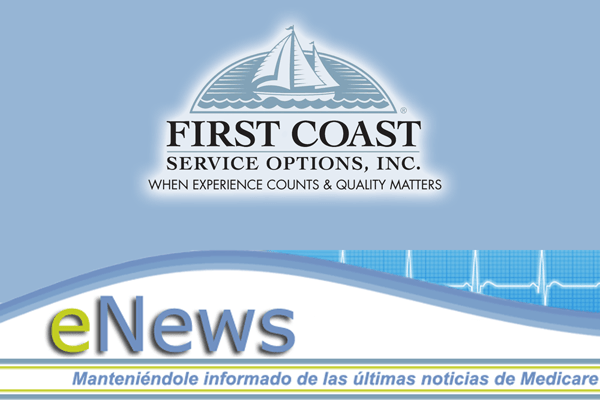
MLN Connects® | Edición especial – viernes 13 de marzo de 2020
In: Circulares, Comunicados, NoticiasCOVID-19: Precio de pruebas, pruebas de laboratorio de diagnóstico, precios y códigos, y cobertura de EHB
- COVID-19: Precio de pruebas, pruebas de laboratorio de diagnóstico, precios y códigos, y cobertura de EHB
- Artículo de MLN Matters® de la actualización trimestral para tarifas fijas de laboratorio clínico y servicios de laboratorio sujetos a pago de cargo razonable
- Cobertura de beneficios esenciales de salud (EHB)
COVID-19: Precio de pruebas, pruebas de laboratorio de diagnóstico, precios y códigos, y cobertura de EHB
El 12 de marzo, CMS publicó una hoja informativa  (en inglés) con información relacionada al precio de los Centros para el Control y Prevención de Enfermedades (CDC) y de las pruebas que no son de los CDC.
(en inglés) con información relacionada al precio de los Centros para el Control y Prevención de Enfermedades (CDC) y de las pruebas que no son de los CDC.
Artículo de MLN Matters® de la actualización trimestral para tarifas fijas de laboratorio clínico y servicios de laboratorio sujetos a pago de cargo razonable
Un nuevo artículo (en inglés) de MLN Matters, MM 11681, acerca de la Artículo de MLN Matters® de la actualización trimestral para tarifas fijas de laboratorio clínico y servicios de laboratorio sujetos a pago de cargo razonable  está disponible. Obtenga información sobre las pruebas de laboratorio de diagnóstico avanzado, los precios y los nuevos códigos. En la página 3, hacemos referencia a nuevos códigos COVID-19.
está disponible. Obtenga información sobre las pruebas de laboratorio de diagnóstico avanzado, los precios y los nuevos códigos. En la página 3, hacemos referencia a nuevos códigos COVID-19.
Cobertura de beneficios esenciales de salud (EHB)
El 12 de marzo, CMS emitió (en inglés) unas Preguntas frecuentes (FAQs)  acerca de EHB para asegurar que individuos, emisores, y estados tengan información clara de beneficios de cobertura para COVID-19. Esta acción esparto del esfuerzo Esta acción es parte del esfuerzo más amplio y continuo del Coronavirus Task Force de la Casa Blanca para garantizar que todos los americanos, particularmente aquellos con alto riesgo de complicaciones por el virus COVID-19, tengan acceso a los beneficios de salud que puedan ayudarlos a mantenerse saludables mientras se ayuda a contener la propagación de esta enfermedad.
acerca de EHB para asegurar que individuos, emisores, y estados tengan información clara de beneficios de cobertura para COVID-19. Esta acción esparto del esfuerzo Esta acción es parte del esfuerzo más amplio y continuo del Coronavirus Task Force de la Casa Blanca para garantizar que todos los americanos, particularmente aquellos con alto riesgo de complicaciones por el virus COVID-19, tengan acceso a los beneficios de salud que puedan ayudarlos a mantenerse saludables mientras se ayuda a contener la propagación de esta enfermedad.
Estas preguntas frecuentes y las acciones anteriores de CMS en respuesta al virus COVID-19 son parte de los esfuerzos en curso del Task Force de la Casa Blanca. Para mantenerse al día con el importante trabajo que el Grupo de Trabajo está haciendo en respuesta a COVID-19; visite la página web (en inglés) del CDC Enfermedad del Coronavirus 2019  .
.
Para información específica de CMS, por favor visite la página web (en inglés) Emergencias Actuales  .
.
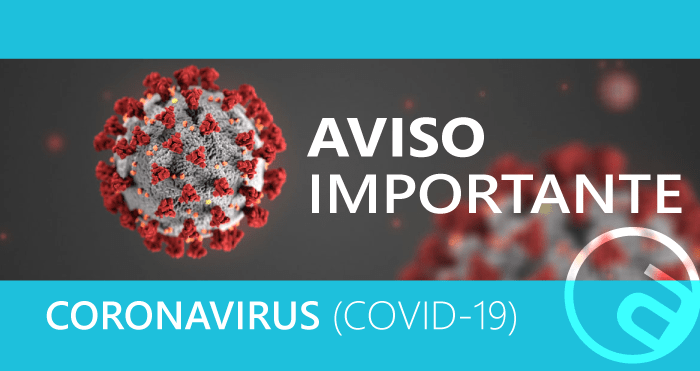
AVISO IMPORTANTE | Coronavirus (COVID-19)
In: Circulares, Comunicados, Noticias16 de marzo de 2020
Ante los acontecimientos relacionados a la propagación mundial del Coronavirus (COVID-19), la seguridad y salud de los clientes y nuestra gente son prioridad para ASSERTUS. Es por ello que, nos mantenemos atentos a las indicaciones oficiales del Centro para el Control y la Prevención de Enfermedades (CDC, por sus siglas en inglés) y el Gobierno de Puerto Rico.
AL momento, una de las medidas más efectivas para prevenir la transmisión del virus en la comunidad es el distanciamiento social. Esto reduce el ritmo de contagio, evita la sobrecarga del sistema de salud y ayuda a proteger el sistema inmunológico.
Somos una empresa que da apoyo al sistema de salud de Puerto Rico, es nuestra responsabilidad y compromiso establecer medidas que permitan atender y mantener nuestras operaciones de manera continua. Con ello en mente hemos establecido protocolos para atender la seguridad de nuestros empleados, socios de negocios, clientes, proveedores y visitantes en general; incluyendo protocolos de higiene y sanitización de nuestras facilidades. Sin embargo, como medida cautelar los adiestramientos grupales que se llevan a cabo en nuestras facilidades se estaránbrindando de manera remota tipo “webinar” comenzando el 26 de marzo de 2020, hasta nuevo aviso.
Para ver los horarios y disponibilidad de estos adiestramientos en línea, puede acceder el siguiente enlace: https://mobile.assertus.com/es/calendario_de_adiestramientos/.
El periodo de este protocolo puede extenderse según se estime necesario para salvaguardar la salud y seguridad de todos.
Si usted tiene alguna inquietud o pregunta no dude en contactarnos vía telefónica al 787-622-2202 o escribiendo un correo electrónico a info@assertus.com.
Nuestro equipo está preparado para apoyarle y orientarle sobre estos cambios. Seguiremos monitoreando el desarrollo del Coronavirus y las recomendaciones por parte de las instituciones pertinentes para la implementación de cualquier otra política adicional.
Le invitamos a que nos siga por nuestros medios sociales; LinkedIn, Instagram, Facebook y página de Internet, donde informaremos cualquier cambio, política o protocolo adicional para la continuidad de nuestras operaciones y servicios.
Agradecemos su confianza y reiteramos nuestro compromiso en ofrecer servicios con la más alta calidad, mientras que nos mantenemos en alerta al desarrollo de esta enfermedad novel.
Agradecemos su confianza y reiteramos nuestro compromiso en ofrecer servicios con la más alta calidad, mientras que nos mantenemos en alerta al desarrollo de esta enfermedad novel.
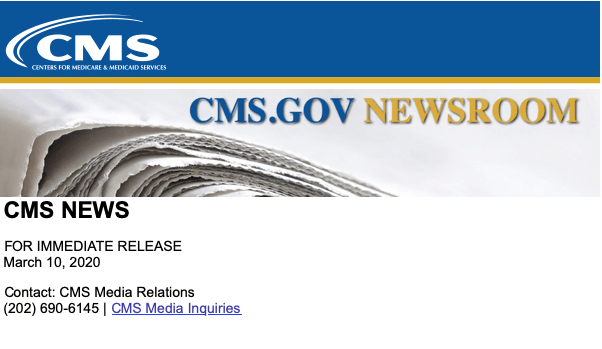
CMS NEWS: Detailed Guidance to Providers about COVID-19
In: Circulares, Comunicados, NoticiasCMS NEWS
FOR IMMEDIATE RELEASE
March 10, 2020
Contact: CMS Media Relations
(202) 690-6145 | CMS Media Inquiries
CMS Sends More Detailed Guidance to Providers about COVID-19
Healthcare workers in home health agencies and dialysis facilities are the latest group to receive important information on protecting staff and at-risk patients
Today, the Centers for Medicare & Medicaid Services (CMS) is supplementing its guidance to home health agencies and dialysis facilities to protect the health and safety of our nation’s patients and providers in response to the 2019 Novel Coronavirus (COVID-19) outbreak.
The memoranda were developed from frequently asked questions the agency has received about interacting with patients amid COVID-19. The guidance offers clear, actionable information to healthcare workers on the screening, treatment and transfer procedures to follow when interacting with patients. This action is part of the broader effort by the White House Task Force to ensure that all of our nation’s healthcare providers and patients – particularly those at high-risk of complications from COVID-19 – remain healthy while helping to contain the spread of the disease.
“We are arming our providers on the front lines with the information they need to remain safe, while giving quality care to their patients,” said CMS Administrator Seema Verma. “Today’s guidance will help providers identify patients who may have contracted the disease and minimize further transmission. It will also equip them to get these patients the medical care they need in order to recover.”
CMS is responsible for protecting beneficiaries who receive home healthcare services as well as those who receive treatment in dialysis facilities. Today’s guidance is an enhancement to the agency’s health and safety requirements and aims to help control and prevent the spread of infection. In particular, the new guidance advises all Medicare-enrolled dialysis facilities to identify high risk individuals prior to appointments or upon arrival, and immediately begin screening for fever or symptoms of a respiratory infection, such as a cough and sore throat, international travel within the last 14 days to restricted countries, and contact with someone with known or suspected COVID-19. Additionally, the guidance recommends screening visitors for potential exposure to the virus, gives detailed instructions for dealing with staff who have either been exposed or are showing signs of illness, and offers a list of frequently asked questions that include responses to help safely treat patients in this setting.
The guidance to home health agencies echoes recommendations set forth by the Centers for Disease Control and Prevention (CDC), with specific considerations of when it is safe to treat patients at home, when patients should be considered for hospitalization and recommendations for family member exposure, when evaluating and caring for patients with known or suspected COVID-19. CMS is recommending home health agencies remain vigilant, regularly monitor patients for any symptoms of the virus, and communicate effectively with patients, family members and other caregivers so that the entire care team understands a patient’s individual needs and goals of care. CMS’s guidance ends with a frequently asked question section offering answers to information that will ensure safe, quality care in the face of COVID-19.
To view, CMS’s guidance for home health providers, visit:https://www.cms.gov/medicareprovider-enrollment-and-certificationsurveycertificationgeninfopolicy-and/guidance-infection-control-and-prevention-concerning-coronavirus-disease-2019-covid-19-home-health
To view, CMS’s guidance for dialysis facilities providers, visit:https://www.cms.gov/medicareprovider-enrollment-and-certificationsurveycertificationgeninfopolicy-and/guidance-infection-control-and-prevention-coronavirus-disease-2019-covid-19-dialysis-facilities
This guidance, and earlier CMS actions in response to the COVID-19 virus, are part of the ongoing White House Task Force efforts. To keep up with the important work CMS is doing in response to COVID-19, please visit the Current Emergencies Website.
Summary of CMS Public Health Action on COVID-19 to date:
On March 9, 2020: CMS delivered guidance on the screening, treatment and transfer procedures healthcare workers must follow when interacting with patients to prevent the spread of COVID-19 in a hospice setting. CMS also issued additional guidance specific to nursing homes to help control and prevent the spread of the virus.
On March 9, 2020: CMS issued a press release highlighting the telehealth benefits in the agency’s Medicare program for use by patients and providers. Expanded use of virtual care, such as virtual check-ins, are important tools for keeping beneficiaries healthy, while helping to contain the community spread of the COVID-19 virus.
On March 9, 2020: CMS published guidance to hospitals with emergency departments (EDs) on patient screening, treatment and transfer requirements to prevent the spread of infectious disease and illness, including COVID-19. Medicare-participating hospitals are to follow both CDC guidance for infection control and Emergency Medical Treatment and Labor Act (EMTALA) requirements.
March 6, 2020: CMS issued frequently asked questions and answers (FAQs) for healthcare providers regarding Medicare payment for laboratory test and other services related to the 2019-Novel Coronavirus (COVID-19). https://www.cms.gov/newsroom/press-releases/covid-19-response-news-alert-cms-issues-frequently-asked-questions-assist-medicare-providers
March 5, 2020: CMS issued a second Healthcare Common Procedure Coding System (HCPCS) code for certain COVID-19 laboratory tests, in addition to three fact sheets about coverage and benefits for medical services related to COVID-19 for CMS programs. https://www.cms.gov/newsroom/press-releases/cms-develops-additional-code-coronavirus-lab-tests
March 4, 2020: CMS issued a call to action to healthcare providers nationwide and offered important guidance to help State Survey Agencies and Accrediting Organizations prioritize their inspections of healthcare. https://www.cms.gov/newsroom/press-releases/cms-announces-actions-address-spread-coronavirus
February 13, 2020: CMS issued a new HCPCS code for providers and laboratories to test patients for COVID-19. https://www.cms.gov/newsroom/press-releases/public-health-news-alert-cms-develops-new-code-coronavirus-lab-test
February 6, 2020: CMS gave CLIA-certified laboratories information about how they can test for SARS-CoV-2. https://www.cms.gov/medicareprovider-enrollment-and-certificationsurveycertificationgeninfopolicy-and-memos-states-and/notification-surveyors-authorization-emergency-use-cdc-2019-novel-coronavirus-2019-ncov-real-time-rt
February 6, 2020: CMS issued a memo to help the nation’s healthcare facilities take critical steps to prepare for COVID-19. https://www.cms.gov/medicareprovider-enrollment-and-certificationsurveycertificationgeninfopolicy-and-memos-states-and/information-healthcare-facilities-concerning-2019-novel-coronavirus-illness-2019-ncov


